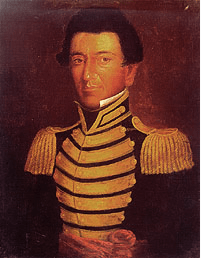Juan Nepomuceno Seguin was born on October 27, 1806 in San Antonio, Texas. His ancestors were founding members of San Antonio and had prominent roles in the beginnings of Texas’ settlement. Seguin’s great-great grandfather, Pedro Ocon y Trillo, served as alderman in the town council during the 1760s. Santiago Seguin, Juan’s grandfather began the ranching tradition in the Seguin family and became one of San Antonio’s principle cattle exporters at the end of the 1770s. Erasmo Seguin, Juan Seguin’s father, was a part of the counterrevolt during the Mexican War for Independence in 1810. From the beginning, the Seguin family was invested in the well-being of the San Antonio community and the Texas settlement. Juan Seguin, himself, became an influential Tejano figure during the Texas Revolution; however, despite a long history of dedication to the well-being of the Texas settlement, he was faced with false accusations despite his endless display of patriotism and efforts that supported the Texian cause for independence. He was a military captain, in charge of his own command primarily made up of other Tejano soldiers.1 He was a politician receiving the titles such as alderman in 1828, alcade in 1833, then becoming the first Tejano to serve in the Republic of Texas Senate in 1837.2 Most importantly, he was a Tejano achieving these great feats in an Anglo-dominated Texas during the nineteenth century. These accomplishments put him under intense scrutiny. Because of the scrutiny Seguin faced, it is important to remember his legacy as a Tejano hero who made many sacrifices for the health of the Texas settlement. One should read sources from either his Mexican or Anglo contemporaries with caution due to their negative biases towards Tejanos. There were many racial tensions between the Tejanos (Mexicans residing in Texas), Mexicans, and Texians (Anglo settlers in Texas) during the time of the Texas revolution. Juan Seguin, with his numerous accomplishments as a Tejano during the nineteenth century, faced these racial tensions from both the Mexicans and Texians primarily due to his position of power, often with the intent to slander his name and image.

To understand why these racial tensions were so prominent, it is important to understand that Tejano was not a word that existed in the nineteenth century. To the Mexicans and Texians, Juan Seguin was still a Mexican. To the Mexicans, Seguin was a traitor to his country, and to the Texians, despite his continuous display of patriotism, he was still a Mexican and should be looked at suspiciously. Seguin knew of these views he was faced with on both sides, as he stated, “The rumor, that I was a traitor, was seized with avidity; by my enemies in San Antonio. Some envied my position, as held by a Mexican; others found in me an obstacle to the accomplishment of their villainous plans.”3 Having a Mexican in such a high-ranking position made people on both sides uneasy—for the Mexicans, they did not want a traitor in power and for the Texians, they did not want someone with ancestral ties to the enemy nation in such power.
From the Mexican side of hostilities, Seguin knew of rumors coming from Mexican sources. In Seguin’s memoir, he tells of a time in which Chevallie, a Texian revolutionary escaped from imprisonment by the Mexicans, told Seguin about some of the rumors he heard while in captivity.
In combination with the Mexican’s attempt to tarnish Seguin’s reputation, the Texians were trying to mar his image as they did not want a Mexican to hold such a great amount of power. Among the rumors of his disloyalty to Texas, Seguin felt threatened and decided to leave Texas and seek refuge in Mexico, where he thought he could retire among his family in Saltillo. Seguin states, “Chevallie told me that Vasquez [of the Mexican army] and his officers stated that I was on the side of the Mexicans.”4 Another Mexican soldier only known as Sanchez, showed Chevallie a letter claiming that Seguin wrote it, while stating, “Seguin is with us.”4 The goal of this was to convince the Texians that while Seguin seemed to be patriotic to the revolutionary cause, he was secretly working with the Mexicans to go against the Texians’ cause at the same time.
Matters being in this state, I saw that it was necessary to take some step which would place me in security and save my family from constant wretchedness. I had to leave Texas, abandon all for which I had fought and spent my fortune, to become a wanderer. The ingratitude of those who had assumed onto themselves the right of convicting me, their credulity in declaring me a traitor on the basis of mere rumors, the necessity to defend myself for the loyal patriotism with which I had always served Texas, wounded me deeply.6
However, once in Mexico, interesting events took place with what seemed to be another attempt from Mexico to slander Seguin’s name. While Seguin wanted to live in Saltillo where he could be close to his relatives, Santa Anna instead wanted him to go to Mexico City.7 However, there was an alternate, more devious plan that Santa Anna devised. Santa Anna decided to allow Seguin to live in Saltillo under the condition that Seguin join the Mexican military and attack Texas citizens.8 This would have shown the Texians that Seguin might have been on the Mexican’s side all along just as the rumors had claimed, or this could have demonstrated, in general, that Tejanos were vulnerable to switching sides. After this event, Texas Ranger Ben McCulloch called Seguin a traitor and compared him to Benedict Arnold.9 From the beginning, the Mexicans wanted to ruin Seguin’s reputation among the Anglos, and with the requirement to make him serve in the Mexican army, it solidified their plan.

Seguin’s reputation was so tarnished, that he published his memoir in 1858 to explain his side of the story in hopes that people would listen and show empathy towards him. Seguin returned to San Antonio after the Mexican-American War ended in 1848 and lived in Texas until 1867, until racial tensions caused him to move to Mexico for the final time, where he lived out the rest of his life until August 27, 1890. When remembering Juan Seguin and other Tejanos in powerful positions, it is important to be aware that many sources are biased due to the racial tensions present during the time. Despite the label he received by his Mexican and Anglo counterparts as a traitor, today Juan Seguin can be labeled as a Texas hero due to his unyielding loyalty to the Texas settlement.
- Jesus F. de la Teja, A Revolution Remembered: The Memoirs and Selected Correspondence of Juan N. Seguín (Texas State Historical Association, 2002), 20. ↵
- Encyclopaedia Britannica, 2016, s.v. “Juan Seguin: Tejano Revolutionary and Politician.” ↵
- Juan N Seguin, as cited in de la Teja, A Revolution Remembered, 101. ↵
- Juan N. Seguin, as cited in de la Teja, A Revolution Remembered, 94. ↵
- Juan N. Seguin, as cited in de la Teja, A Revolution Remembered, 94. ↵
- Juan N. Seguin, as cited in de la Teja, A Revolution Remembered, 96. ↵
- Juan N. Seguin, as cited in de la Teja, A Revolution Remembered, 97. ↵
- Juan N. Seguin, as cited in de la Teja, A Revolution Remembered, 97. ↵
- Ben McCulloch to William W.S. Bliss, June 23, 1846, Ben and Henry Eustace McCulloch Family Papers, 1798-1961, Dolph Briscoe Center for American History, The University of Texas at Austin. ↵



35 comments
Ryan Estes
This was a very interesting read and I learned a lot about one of the important figures in Texan history. I kind of feel bad for Juan Seguin, as the rumors concerning his disloyalty to Texas caused him to move to Mexico. I can not imagine what was going on in Texan soldiers’ minds when they saw Seguin attacking them. They must have been shocked and angry at what Seguin was doing.
Engelbert Madrid
Juan Seguin truly demonstrated his loyalty to the Texan flag and its people. Despite he was not accepted by the majority of the Anglo-Texan community, he desired to establish a fundamental republic in Texas. Unfortunately, his reputation was ruined by the Mexican government, which led to a failed relationship with white Texans. However, today’s historians have agreed that Seguin was a true Texan hero that wanted Texas settlement to be free from Mexico.
Jennifer Salas
Seguin was well aware of the obstacles he was facing, and knew they were out to ruin his reputation. I think it’s crazy how he went through all this and know he is known as a Texas hero. I’ve never heard about Seguin before and I can’t help but to feel bad for him because he was constantly being mistreated and forced to choose a side.
Kristy Feather
I remember when I was in middle school, we studied the war between the US and Mexico. In California, we didn’t feel as proud of the historical value of the Alamo or the Heros that came out of the war, but I do distinctly remember spending two whole weeks focusing on Seguin’s life. I think this article did a fantastic job of showing the same thing my teacher did which was that Seguin just wanted what was best for his people, he was not anymore a traitor than anyone else.
Madison Guerra
I could not imagine being in the situation Juan Seguin was in. He was resented by the Mexicans and called a traitor, and the Texians thought of him as another untrustworthy Mexican. He didn’t fit in or belong anywhere and he tied so hard to be accepted. If i were in his shoes i would have been frustrated and sad and not known what to do. His reputation had been ruined and he couldn’t do anything about that.
Andrea Cabrera
As a foreigner is the first time I read about Juan Seguin and is sad to learn that his reputation was so damaged that he tried his best to fix it on his own memoir in hopes that someone will show empathy towards him. Unfortunately this was not the case and he went back to live in Mexico. We need to understand that sources are biased due to the racial tensions of the time. Now Juan Seguin has the honor of been one of Texas heros due to his loyalty for the land.
Jabnel Ibarra
Historical bias is unfortunately common in many of the things we think we know. This was a very intriguing article. I’m glad you took a different approach to Seguin’s story and explained what happened from his point of view, as I likely would never have learned what really happened from an unbiased standpoint. I hope that Seguin was able to live the remainder of his life in peace.
Alyssa Garza
This article was very interesting to read since it was very informative about Nepomuceno side of the story. It’s sad to see that Nepomuceno couldn’t pick the side he wanted because of everything that was going on and his reputation got ruined for nothing when he was a great man. I couldn’t put myself in Nepomuceno shoes and let people misunderstand my choices for a while especially with the amount of power he held at one point.
Emily Jensen
I loved this reading article. I hadn’t heard of the history of Seguin, TX, so reading Juan Seguin’s story was really interesting! How frustrating it must have been to have been hated by both the Texians and the Mexicans, with both groups attempting to slander his name for multiple reasons. His dedication to the Texas settlement shined through his actions, which is why he can be called a Texas hero.
Belene Cuellar
It’s sad to see such a loyal man be persecuted and not trusted when all he did was prove his loyalty time after time. All of this hatred was not what he deserved at all. I have never actually heard of Juan until this article. I am glad to see that despite all the hate and mistrust with the people he still remained loyal to the end,